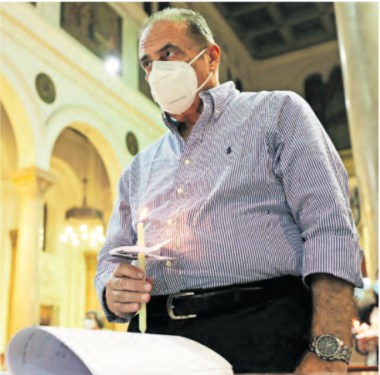By Engy Magdy, Special to The Tablet
CAIRO — Coptic Christians in Egypt are desperately waiting for action to be taken on a new law governing the legal status of their worship, which was drafted by leaders of the other main churches in Egypt and the Ministry of Justice several months ago.

While the draft is awaiting review and approval by the Egyptian Cabinet before it is sent to Parliament for a vote, its contents have been shrouded in secrecy, and frustration is growing over the lack of public hearings and dialogue with the Coptic community.
Representatives of the other Egyptian churches, who are on the drafting committee, refuse to disclose anything related to the new law.
Even the Coptic Christians’ own lawyers are barred due to a gag order to speak on the draft.
“There is an agreement between us and the Ministry of Justice not to disclose anything now,” Monsef Suleiman, legal advisor for the Coptic Orthodox Church, responded to The Tablet’s request for comment.
Kamal Zakher, a Coptic intellectual and researcher, expressed his concern about the law.
“Before enacting the law or discussing it in the Parliament, it must be presented in public hearings, this is a principle agreed upon in all parliaments of the world,” Zakher said. “That law affects a broad base of people and is related to their future and families. The situation is still opaque. I fear that we will be surprised by a law that may put us in a new complex spiral.”
As the uncertainty around the bill persists, some aspects of it — including matters involving marriage, divorce, adoption, and maternal rights — have leaked to the local press, sparking confusion and controversy.
For decades, Coptic Christians have suffered from being subject to the provisions of Islamic (Sharia) law concerning many aspects of life. There is no civil marriage in Egypt, and so Christians in the country are subject to the rules of their sect, which usually refuse to grant the right to divorce or to remarry after obtaining a civil divorce.
Article 3 of the 2014 Egyptian Constitution states that “Christian laws are the main principle in personal status legislation,” giving the other five major Egyptian churches, — Orthodox, Catholic, Evangelical, Syriac Orthodox, and Greek Orthodox — permission to draft new legislation consistent with the Christian principles.
During the process of drafting the legislation, there were some points of contention; one between the churches themselves and others between the churches and the state.
According to sources familiar with the matter who spoke to The Tablet, the main dispute between the churches was related to divorce. The issue was resolved, however, by allocating specific divorce provisions to the different denominations, according to Jameel Halim, a legal adviser to the Catholic Church.
While the Catholic Church does not recognize divorce; it has what is known as “physical separation.” The Catholic Church allows annulments based on the invalidity of the marriage contract.
“The invalidity is not like divorce; the marriage contract is void in case of the absence of consent or satisfaction of one of the spouses when there is a disease or illness that one of the parties has hidden before marriage, [or] in the case of a person who has had a hidden previous marriage,” Halim explained.
However, in the Orthodox and Evangelical churches, divorce will be possible under certain terms and conditions. Two valid reasons are adultery and a change in religion.
Besides those reasons, the Coptic Church will allow divorce in case of separation between the couple for five years if they have children and three years for those who don’t have children, which is called “the impossibility of companionship.”
The issues of inheritance and adoption were also points of contention with the state, due to conflict with Islamic law.
According to a church source who talked to The Tablet on condition of anonymity because of the sensitivity of the issue, “There was pressure from the state on the representatives of the churches in terms of the two issues: Sharia law does not accept adoption, to avoid intermingling of genealogies.”
Halim said “the issue of adoption is not included in the law because it regulates the issues of marriage and inheritance.”
The total blackout and secrecy imposed by the state and other churches on the bill raised doubts that the drafting committee can agree on any of the contentious matters.
“There is a state of utmost secrecy. Neither the churches nor the Ministry of Justice wants to publish the draft law or announce the reasons for its delay. For example, we do not know precisely what the inheritance article includes. Does it determine the heirs by the principles of Christianity? Does it state the distribution of the inheritance equally between male and female?” said Ishak Ibrahim, a researcher at the Egyptian Initiative for Personal Rights (EIPR).
While the Egyptian churches allow divorce on the grounds of adultery, the concept of adultery has reportedly been expanded in the new legislation to include “judgmental adultery,” not limited to sexual relations only, but also telephone calls, online messaging, incitement to prostitution, exchanging wives … etc.”
Another criticism of the draft law committee is that it did not include any women, as the law was drafted by men who represented the churches and the Ministry of Justice.
“The exclusion of women from the drafting process is a consolidation of patriarchal norms and traditions against women, even though they are a major partner in the implementation of the law,” said Viola Fahmi, a Coptic journalist specializing in human rights and religious freedom issues.
The legislation denies mothers guardianship over their children in matters related to health care, education, travel, and the issuance of official papers, and deprives them of the right to register their newborns without the presence of the father.
“Patriarchal norms are the main reason for legal discrimination against women; it aims to exclude women’s concerns, fears, and demands from the tables of the drafting process,” Fahmi said.
